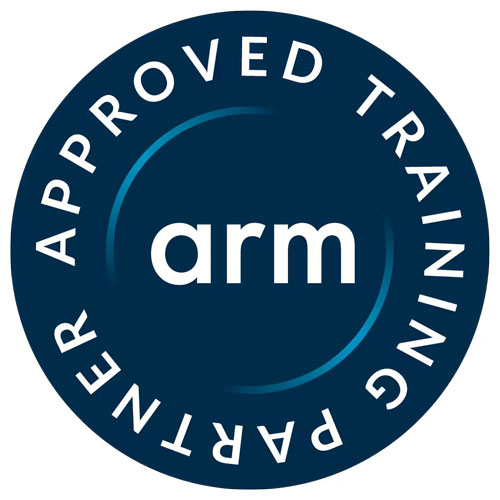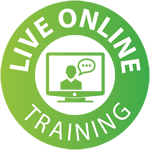Standard Level - Live Instructor-Led Training
4 days (In-Person) 8 hours per day or
5 sessions (Live Online) 6 hours per session
Project-ready training for product development based on platforms incorporating Arm® microcontroller IP
This course is designed for engineers developing software for platforms based around Arm® Cortex®-M Series processors with v6-M and v7-M architecture. The course includes an introduction to the Arm product range and supporting IP, the processor core, programmers' model, instruction set and debug architecture. It includes a number of worked examples and hands-on CMSIS compliant exercises to reinforce the training material. It also includes content on the very latest M Series cores including the Cortex®-M7.
Hands-on Labs
The learning is reinforced with unique Lab exercises which are run inside a self contained virtual machine environment. This allows the student to experience a real-life and project-ready development environment without the complexity of installing complex software prior to the class. This virtual machine is for the student to keep after the training class, allowing you to further experiment with embedded software development once the class has come to completion.
Software engineers writing C/C++ based applications for platforms using the Arm Cortex-M processor cores: M0, M0+, M3, M4 and M7.
For training on Armv8-M based cores visit: Cortex-M23 and Cortex-M33.
For delegates interested in the security features of the Cortex-M23/M33/M35 & M55, the Arm TrustZone-M for Cortex-M23/M33 is ideal follow-on training.
- Some knowledge of embedded systems
- Basic awareness of Arm is useful but not essential
- Experience of C or assembly programming is not required but would be beneficial
This class is based on source training material developed by Arm themselves, augmented with supplemental content and labs developed by Doulos. Doulos is a global Arm Approved Training Center.
The majority of the course content and sessions are relevant and of value for engineers developing products using platforms based on the current Cortex-M Series family (with Armv6-M and v7-M architecture). In public class delivery contexts, the specific agenda followed may vary from that indicated below dependent on the focus and interests of the course participants attending that event. Upon registration, course participants will be asked to indicate which specific M Series core they are focusing on, which will steer the class agenda to some degree.
Note the course includes a valuable comparison of capabilities and application variance between different members of the M Series family which will be of benefit to evaluators as well as those preparing for project.
For private team-based training for software developers, the course can be focused entirely on a specific M Series core. The course descriptions for these courses can be found below:
For private team based training for system designers and integrators, there are also course options available:
Introduction to Arm
Arm as a company • Processor portfolio • Supported architectures • Processor profiles
Cortex-M Overview
Block diagram • Architectural features • Instruction set • Programmer's model • Memory map • Memory interfaces • Caches • Exception handing • Memory protection • Power management • Implementation options
Cortex-M Programmers’ Model
Data types • Core registers • Modes, privileges and stack • Exceptions • Instruction set overview
Assembly Programming
Data processing instructions • Load/Store instructions • Flow control • Miscellaneous instructions
Synchronization
Introduction to synchronization and semaphores • Exclusive accesses • Bit-banding
Memory Model
Memory address space • Memory types and attributes • Alignment and endianness • Barriers
Data memory barrier • Data synchronization barrier • Instruction synchronization barrier • Barrier applications examples
Memory Protection
Memory protection overview • Regions overview • Regions overlapping • Setting up the MPU
Embedded Software Development
Default compilation behavior • System startup • Tailoring the image memory map to a device • Post startup initialization • Tailoring the C library to a device • Building and debugging an image
Compiler Hints & Tips
Basic Compilation • Compiler optimisations • Coding considerations • Mixing C/C++ and assembly • Local and global data issues
Linker Hints and Tips
Linking basics • System and user libraries • Linker script • Veneer and interworking • Linker optimizations and diagnostics • GNU embedded development libraries
Exception Handling
Exception Model • Interrupts • Writing the vector table and interrupt handlers • Internal exceptions and RTOS support • Fault exception
CMSIS Overview
CMSIS-Core • CMSIS-DSP • CMSIS-RTOS • CMSIS-SVD • CMSIS-DAP
Armv7-M Extensions
DSP • Folating Point
Debug
Coresight and debug access port DAP • Debug event and reset • Flash patch and breakpoint unit (FPB) • Data watch point and trace unit (DWT) • Instrumentation trace macrocell (ITM) • Embedded trace macrocell (ETM) • Trace port interface unit (TPIU) • Implementation details
Cortex-M7 L1 Sub-Systems
Caches • Tightly coupled memory (TCM) • System consideration
Our hands-on exercises are provided as a self-contained virtual machine that can easily be taken away by the students by the end of the class. Our virtual machine works on most operating systems and features a full pre-configured embedded development environment based in industry de-facto standards such as GNU tools and Eclipse. The laboratories work both on pre-installed instruction set simulators and the supplied microcontroller development boards.
The exercises cover a large spectrum of topics; Starting with assembly programming, data transfers, data processing, flow control, digital signal processing. Exception handling with the implementation priority schemes and pre-emption. Mixing C and assembly to provide a semi-hosted solution.
STM32L552 Evaluation Board
Arm® and Cortex® are registered trade marks of Arm Holdings Plc.




